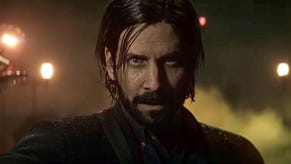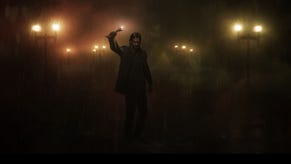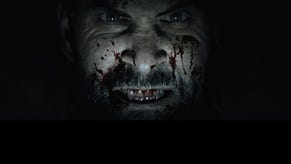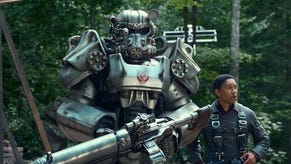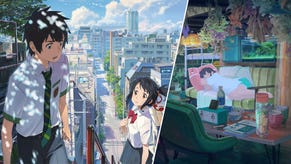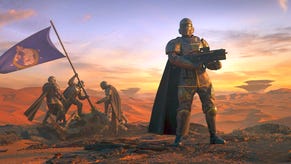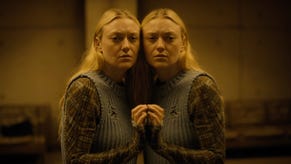Interview: Remedy answers your questions on Alan Wake
Five long years after it was announced at E3, Remedy finally releases Alan Wake tomorrow in the UK and Europe for Xbox 360, with a US launch on Tuesday.
Anyone not buying it are obviously nuts for not doing so: game looks set to properly pump up the volume, according to reviews that came out for the thriller last week.
On Monday, we asked you for your questions for the Finnish developer, and you came in with an impressive set of them.
The best answer will get an Alan Wake Super Elite 360 bundle, with runner-up prizes consisting of Collector's Editions of the game. We'll let you know of the winners soon.
For now, get your answers from Remedy writer Mikki Rautalahti below.
VG247: Like Max Payne, the name Alan Wake is obviously a pun. What were the other first names beginning with ‘A’ you came up with at that first brainstorming session?
Mikki Rautalahti: Well, there was Albert Cohol, who fought the darkness with the power of drunkenness. He was awesome, but for some reason, the more research we made into his background and powers, the less work we seemed to get done. Also, the liver damage was getting pretty extensive. So we went with this other guy instead.
If you had your time making the game again (but know what you know now), what would you do differently?
Mikki Rautalahti: So many things. Making a game is very much a process of trial and error; you never really know what makes for great a gameplay experience until you’ve experimented and tried different approaches. But if I had to pick a specific thing, if I could step in that time machine, I’d make sure nobody ever mentioned the words “open world” in public. We thought that was a great idea, and then we proved ourselves wrong; it wasn’t getting us the game we wanted to make.
That’s no big deal in itself; it happens in game design all the time – you try things, you learn from them, and then you move on. Unfortunately, at the time, that really was the hot bullet point, it was what everybody was doing. We would’ve saved ourselves and the fans a plenty of headache and confusion if we’d just kept quiet about the game until we knew for sure what it was going to be… Of course, at the time everybody thought that was what it was going to be. I’m pretty sure you can drive yourself crazy if you start going over every little detail with the benefit of hindsight.
If Sony would give you a good sum to make a killer app exclusive to PlayStation 3, you could accept?
Mikki Rautalahti: Well, it’s always easy to speculate, of course. But as long as we're talking about the actual situation at hand, I think we're pretty comfortable right where we are. Microsoft has been a great partner for the development of Alan Wake – everybody knows it took a long time, and we’re glad that they gave us the time we needed. The game has been received very well, and since Alan Wake was always planned as a franchise, that’ll most likely mean a sequel. We always intended Alan Wake to be more than just one game, and we see it as something that can cross over into other forms of media as well. We're a small studio, and we can only handle one big project at a time, and right now that’s Alan Wake. I don’t see that changing anytime soon.
With each year that passes, not only does the average age of the gaming public increase but far more women game too. How does that impact the game, its content, presentation, and the overall development process?
Mikki Rautalahti: We did want to specifically make a game that wasn’t intended for children as such – I mean, clearly younger people can play it and get a lot out of it, but I think our ideal player was an adult, somebody who can relate to story elements like Wake’s marital problems, because things like that are a huge part of Wake's motivations and the story that we're telling.
I think there’s a tendency to kind of underestimate your audience in video games, to dumb things down. You kind of go for the low-hanging fruit a lot of the time, you know? And it’s not because the people making the games don't have any vision, it's just that there’s a lot of pressure to do that, to follow those video game conventions even when they aren’t doing you any good.
As for women, I really don’t think they require any kind of special treatment. You tell a good story and make the gameplay fun, I think they’re going to be interested. The classic video game industry approach has been kind of ham-handed, the equivalent of making things pink and sticking Barbie in there. “Hey, let’s talk about shoes and shopping, tee hee!” But I know a lot of women who play games, and they really don’t care about any of that, or about whether the main character is a man or a woman. That doesn’t matter to men, so why would it matter to women? They just want to play good games that don’t treat them like they’re idiots.
We very intentionally made a game that has a lot of female characters. Some of them are goofy, sure, but that definitely goes for the men in Alan Wake as well. But a lot of them aren’t. Actually, I read one review that said that Alice set female characters in video games back ten years, because she’s afraid of the dark, and I really felt weird about that. Yeah, we have flawed characters. Alice has a strong phobia, but she’s also smart and funny, and she doesn’t dress like she just escaped from a porn movie. Wake has his own flaws – he drinks too much, his impulse control sucks, he prefers brooding to working… These aren’t perfect people, but I think these are things people can relate to. We really, really didn’t want to make them vacuous people who’re only motivated by a mission to DESTROY THE BAD EVIL, you know? That’s not a personality, that’s just a job.
I don’t think we need to make games that are specifically geared towards women… but it would probably be a good idea to make fewer games that are specifically geared towards adolescent boys.
Lots of games seem to take influence from the films of Ridley Scott (especially Blade Runner, Alien and Black Hawk Down) but Alan Wake is one of the very few that looks towards David Lynch. What attracts you to Lynch and why do you think most developers seem to shy away from his films and the atmosphere they create?
Mikki Rautalahti: Lynch is awesome, of course. His films tend to have a very distinctive, very strong atmosphere. There’s that dreamlike quality to them, a pervasive sense of fundamental uncertainty that runs through the stories. He does those weird and twisted moments so well, and there’s nothing random about them. He builds the atmosphere very deliberately, and it really enables him to tell stories that you couldn’t do with more traditional filmmaking. There’s a strong element of fantasy to a lot of his work, and that’s very appealing to us.
But in terms of creating a video game, that kind of atmosphere is very challenging to create. This isn’t so much related to Lynch per se, it applies to just about any game that really relies on its atmosphere. It’s easy to say, “hey, let’s make a really moody game!” but actually creating that mood is a combination of so many things coming together just right. There's no setting in the engine that you can tweak to increase the tension, you know? Ultimately, that’ll happen in the player’s head, and all you can do is try to set everything up so that it flips that mental switch and the player gets sucked in. That takes a lot of trial and error, a lot of polish. It’s a delicate thing.
And when a player is going through the game, there needs to be a certain sense of progression and drive so the player knows what he’s trying to accomplish. That requirement can really clash with what you’re trying to do in terms of the ambience, so it’s tricky – and without that atmosphere, the game will just fall flat on its face, so there’s quite a bit of risk there.
And if you get it right, you’re still kind of swimming against the current, because then you have a game that people don’t quite know what to make of, and you have to put a lot of effort into selling it to them – that’s generally the publisher’s view of the whole thing. Especially in this economy, I think they often prefer the sure thing, and it's hard to blame them, considering how much money games cost to make these days. It’s definitely easier and safer to do a hard-hitting action game where elite special forces are on a crazy high-octane mission. If you do that well, you’ll have a great game that’s more or less guaranteed to sell, the audience is already there.
Was there ever consideration of contracting a horror author like Stephen King or Dean Koontz to write Alan’s “narrative” passages?
Mikki Rautalahti: No. And I’m not saying that just because bringing somebody like that would essentially make me superfluous! Honest!
But seriously, it’s an interesting question. I’m sure that kind of a move would have a lot of PR value, but from a purely practical standpoint, bringing in people who probably don’t know how games work is problematic at best. It’s not a question of skill; obviously, both King and Koontz are very good writers, but it's a very different kind of medium when the player is supposed to interact with something. It requires a different approach, a different attitude.
Furthermore, we really want to intertwine the story and the gameplay as well as we possibly can, which means that the writing and the game design need to go hand in hand. That’s a constant, ongoing process. There are games where someone can write the script and just mail it in, and then maybe have a couple of meetings with the designers, and that’s that, but it absolutely wouldn’t work for us. Anybody who’s doing something like this needs to be a part of the team pretty much on a daily basis, and I kind of doubt either of them would want to move to Finland for several years!
When you first started developing Alan Wake, there was a poll in which you asked fans how Alan should interact with [enemies]. A majority of fans opted for a gun. As the idea of this game developed further as a psychological thriller, you encompassed the idea of using light as a weapon. What made you still use a gun as an option?
Mikki Rautalahti: Variety, for one thing. Using just the flashlight throughout the game wouldn't be very satisfying – if it was just that, then it would really be just a ray gun by a different name, I think. But when you throw the gun in there as well, the dynamic changes. Then you have two aspects to the combat. It gets more interesting and hectic, because you’re juggling two things all the time.
We make it pretty easy in practice, of course, but it is an additional challenge, and when you have bad guys all around you, it gets pretty exciting. There are two resources you need to keep track of, and you need to try to control the enemy’s movements. Bullets only work when you’ve burned all of the protective darkness away, but you can use the boosted light beam to stun the enemies, so you keep flicking the beam back and forth, buying an extra second here so you can finish that guy over there… It’s a fun game mechanic, it works very well.
One of the more prominent themes in Twin Peaks is that the aw-shucks good-naturedness associated with small-towns is just a front for dark dealings behind closed doors. Many Stephen King novels also explore this same theme. As both Twin Peaks and King were obvious influences on “Alan Wake,” what can Bright Falls tell us about isolated communities and the people who thrive there? Is there any larger social commentary beneath the psychological action thriller aspects of the game?
Mikki Rautalahti: Well, we’re not saying that everybody who lives in a small town is either crazy or evil, if that’s what you mean. But I think places like that are very interesting, because everybody knows everybody. You don’t have that anonymity that big cities bring.
I mean, I live in Helsinki, which isn’t even a huge city by international standards, but even so, I don’t know a single one of my neighbors. I say “hi” when we pass in the corridor, and that’s it. But we have this cabin out in the country, and when I’m up there, sometimes I’m walking down a road and somebody I’ve never seen before comes along in a car, slows down, rolls down the window and says hi and tells me where he lives, and we chat for a moment and then he goes, “well, gotta go.”
It’s just a very different dynamic, and I think when you’re in a situation like that, you probably know a lot of stuff about other people that would ordinarily be considered kind of private in a more urban environment. You know who’s got that drinking problem, who had the affair, all sorts of little secrets, and we’ve all got ‘em. Some of us have things that are just really bad, and I bet those don’t stay too secret either, even if people politely refrain from talking about them in public. From a storytelling point of view, that’s a great thing, there’s a lot in there to work with. But I’m not sure if that makes it a social commentary.
Alan's a writer, and his lastest work is about a policeman in New York who's wife and child have been killed, and this story has become popular. Hasn’t this story got a relationship with Max Payne?
Mikki Rautalahti: Now what ever gave you that idea? Well, Remedy’s certainly very proud of it’s history and we know and love our dedicated fans. We have hidden a few references to our previous work in the game. They are there for the fans to find and I hope enjoy the hunt. I wouldn’t want to spoil that for anybody by listing them out.
Given that traditional horror games appear to be floundering or becoming more like standard third-person shooters, did you have specific ideas on how to reinvent the genre for the 21st century right from the start? Were there things that you definitely wanted to do or to avoid in order to stand out from the crowd or broaden the game’s appeal beyond the usual horror game fanbase?
Mikki Rautalahti: Well, Remedy had done Max Payne before, and there was really no desire to just do the same thing all over again. That was a big motivation for us, to do something that had a different tone and different gameplay experience. Honestly, I don’t know if we set out to reinvent anything. I think that kind of thing is generally determined by history, anyway.
But I do know that we didn’t really set out to make a horror game – we think of it as a thriller, a tense and exciting and unpredictable journey with lots of twists and turns in the way. To a great extent, it‘s a mystery game. I know we kind of get put in the same category with horror games, and that’s not unreasonable, but that just wasn't how we approached the project ourselves.
That said, I do think we may very well appeal to people who generally stay away from scary games, because the way we handle things is very different. We’re far more about the tension than the sudden scare, and we don’t have a lot of blood and gore. There’s that classic horror game situation where you see a trail of blood, and you follow it to this room that has bodies all over the place, hanging from butcher hooks in the ceiling, the walls are painted red. And you go, "oh, this is bad, this is so goddamn bad," and that's a very visceral experience when you do it right. The Silent Hill games do that kind of thing particularly masterfully, I think.
But we specifically didn’t want to do anything like that. That’s like being hit in the face with a hammer. You can get a really strong reaction like that, but there’s also a sort of a release of tension there, because when you’re in that situation, you know where you stand, if only for the moment. We really wanted to build the tension and keep tightening the screws in ways that are much less obvious. We wanted the threat to be more nebulous and pervasive, harder to grasp and harder to deal with.
Alan Wake releases tomorrow in the UK and Europe for Xbox 360.


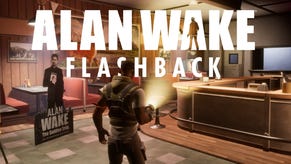
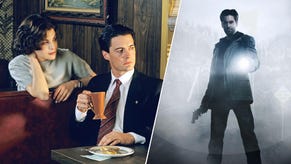
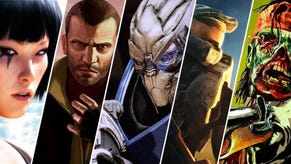
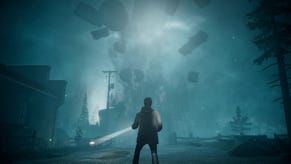
.jpg?width=291&height=164&fit=crop&quality=80&format=jpg&auto=webp)
